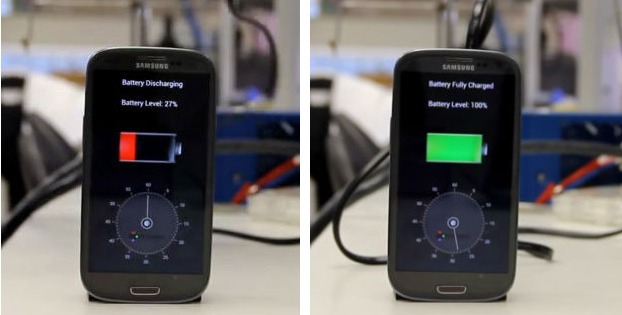Israeli startup StoreDot, which debuted its FlashBattery smartphone battery charging technology at CES 2015, could have its technology go into mass production as early as 2018, suggests a BBC report based on an interview with StoreDot CEO Doron Myersdorf.
According to Myersdorf, manufacturers have already signed up to use their smartphone battery technology, although he did not reveal their names. The technology involves the use of nanomaterials and certain unnamed organic compounds that are being kept under wraps.
The earlier versions of their prototype smartphone battery were actually thicker than typical smartphone batteries, but Myersdorf indicated that they were now ready to go to market, which presumably means they’ve improved on the technology over the past two years or so.
Pilot production has already begun, he said, and mass production will begin at two Asian battery makers’ facilities in Q1 2018.
If the claim is true, we could soon see smartphone battery units that can soak up a full charge in five minutes using the new tech. And it’s apparently not limited to smartphone battery technology. Last week, at the Cube Tech Fair in Berlin, Germany, StoreDot revealed an EV battery that could fully charge in five minutes and provide a range of 300 miles.
Myersdorf confirmed that the company had no contracts in place with any carmaker, and that the technology will take at least three years to hit public roads.
In comparison, Tesla’s Supercharger technology requires at least 75 minutes for a full charge, according to CEO Elon Musk. Using the same charging system, Tesla’s batteries can provide about 170 miles of range with a half-hour charge.
StoreDot’s technology is clearly far superior. Again, if the company’s claims are true and their demonstrations can be replicated in live situations and batteries mass produced using this technology, it could revolutionize multiple industries that depend on battery power for storage and delivery.
Some experts remain cynical, like technology analyst Ben Wood of CCS Insight, who told the BBC:
“Taking risks with battery technology can bite you. I would say that experience has taught me to always remain sceptical. Let’s see if it happens would be my view.”
However, Wood also admitted that anyone who managed to overcome current constraints on battery charging “could have a transformational effect on consumer electronics.”
Several companies, including Qualcomm and Huawei, are working on improving charging times for batteries, and have already showcased their respective versions of quick-charge batteries. But none of these comes close to what StoreDot claims that its technology can achieve.
But for any new technology to go mainstream, the ability to mass produce at a practical price point is the key element. We’ll have to wait and see if StoreDot’s smartphone battery tech can actually overcome this major hurdle.
Thanks for visiting! Would you do us a favor? If you think it’s worth a few seconds, please like our Facebook page and follow us on Twitter. It would mean a lot to us. Thank you.



